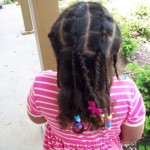When African-American comedian Chris Rock was asked by his 5 year-old daughter why she had bad hair he was compelled to make a documentary about black hair delving into the million dollar black hair industry.
When it comes to black women and their hair few debates provoke passionate discussion and disagreement in the black community than this issue. When a black woman perm or straighten her hair is she ashamed of her natural hair? Do weaves and extensions indicate that many black women are unhappy with the hair that they were born with? No doubt the arguments for and against these questions will be fierce and the lines will be drawn between those who oppose chemical treatment of Afro hair and those who perceive these options as a style choice rather than a crises of self identity.
Whatever our views on black hair there is no doubt that we have to be concerned when a young black child believes that she had ‘bad hair’. Where do these perceptions come from? The media? From within our own community? It would seem so.
Many black men and women in Britain can relate to negative comments made about natural African hair. The more European and straight your hair was and the greater approval you had from black people and members of your own family. You had ‘good hair’ if it was straight and ‘bad hair’ if it was kinky and naturally coarse.
When Chris Rock’s 5 year-old daughter, Lola asked him “Daddy, how come I don’t have good hair?”, (ET: 31 July 2009) it was a question that troubled him greatly as a father and he decided to look into why his five year-old daughter would have such a negative portrayal of her own hair.
Lola’s question is troubling to all of us in the black community. Why should our young females feel so unappealing at such a young age?
Rock delves into the $9 billion black hair industry and visits barbers, beauty salons, hair conventions and laboratories where he learns about the chemicals that are used to straighten hair, and his findings paints a picture of a black community still grappling with self identity and still having difficulty associating African characteristics with beauty.
“Black women, according to researchers Mintel, are willing to spend at least double the amount on hair and beauty products that white women do. In the eight years to 2002, the market for black female beauty products grew by 48%”, says Hugh Muir. (Guardian: 3 June 2010)
While the Mintel research can be interpreted as the growth of black female spending power another similar growth in the cosmetic industry relating to black women indicates a far more disturbing trend.
Alphonso Van Marsh, in a report for CNN Health in November 2007, said “Skin bleaching — using chemical or natural products to lighten skin color — is common practice in the Americas, Africa, across Asia, and increasingly, in Europe.”
Marsh added, “And as the UK’s Asian, African and African-Caribbean communities grow, so too — cosmetics industry experts say — does ethnic spending power for products promoted to lighten skin tone.”
The growth in skin lightening products alongside the growth in hair products can be no coincidence and clearly links to a negative self perception of how many black females see themselves and African characteristics.
Yes, the media has much to answer for with the constant dominant images on television portraying the European female as the ideal beauty but there is still a strong argument that the black community themselves perpetuate the negative concepts of African characteristics. There are parents who treat their young children’s hair with chemicals at a very tender age in order to straighten it and this cannot be good for a child’s hair, nor can it be good for their perception of their own natural hair.
When the civil rights movement in the 1960s in America led to the black beauty consciousness and pride in natural black hair as well as the iconic Afro this was good for black people but it seems that 50 years on and there is a backward trend.
When it comes down to it, is this debate about black hair overblown? Obviously, a black woman can style her hair into a perm and still have a strong black identity. Nevertheless, when a young girl can ask her father why her hair is bad it says alot about how far the black community has come in relation to their self image and unfortunately it is not very far at all.
“Good Hair” by Chris Rock is set to be released in UK cinemas on June 25
For further research:
http://edition.cnn.com/2007/HEALTH/11/26/vanmarsh.skinbleaching/index.html?iref=mpstoryview
http://www.guardian.co.uk/uk/2010/jun/03/black-hair-business-chris-rock



